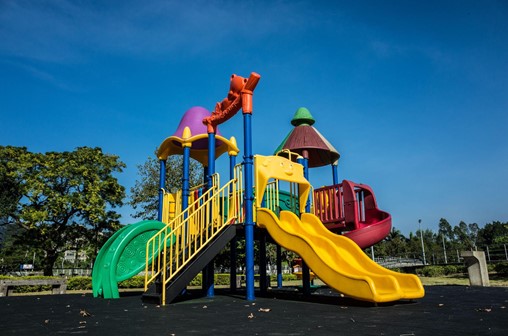
Kids have different types of play that develop their skills. These skills develop in different ways. Some play is for building independent thinking; some are for developing social skills, while others play is to enhance imagination. However, all children need different types of play to be happy, healthy, and productive. These skills help children begin to learn how to cooperate, how to share, how to respect the abilities of others, and how to rely on others to achieve their goals and dreams. The best place for children to learn these skills is your local playground.
Playgrounds aren’t just for fun; they are also designed to teach your children essential skills they will use for the rest of their lives. Playground components are used to create structures that match those types of play, providing a fun way for children to learn these skills. So what are all the different types of play? And what playground components are best for these types of play?
Solitary Play
Solitary play allows your child to explore and learn on their own; This is good for their self-assurance, independence, and self-direction; All ages benefit from solitary play. Many different types of playground components provide solitary play opportunities, such as activity panels, riding animals, and slides.
Parallel Play
In this type of play, children act similarly to one another but with their ideas, style and creativity. Children begin parallel play when they are young, usually within the first two years of age. At this stage, children can use their hands and fingers to perform tasks, such as painting, singing, walking, talking, and brushing their teeth. Babies and toddlers also tend to imitate their parents when they are doing these tasks. As children grow, they begin to use their imagination to explore the world around them and plan and create new activities.
There are many playgrounds that offer great possibilities for parallel play as most playground components are designed for children to play together, whether going down the double slides, playing a game on the activity panels, or swinging together.
Onlooker Play
This type of play is brought on after solitary play when a child is watching the other children or even parents and trying to understand what everyone is doing and why they are doing it. An example of this is maybe they see a group of children playing a game and they want to understand how the game is played first before joining in. A great way to allow Onlooker play is to have a place for children to rest and sit, and be able to scope out the playground for themselves. This could be a bench or maybe riding animals.
Associative Play
Children benefit from playing associatively in terms of their social and verbal development. During this phase, the child begins to play with others and begins to learn about social interactions. Playing imaginary games or simply conversing with others are examples of this. Children engage in cooperative games to learn about teamwork and communication.
Like parallel play, many playgrounds offer great possibilities for associative play as playground components are designed for children to play together.
Dramatic Play
Dramatic play is when children use their imaginations, whether it’s just themselves or along the side of others. It’s an essential type of play as children can learn about communication skills, sharing, creativity, and emotional development by just playing pretend. This type of play should always be encouraged.
The entire playground is used for this type of play. Playgrounds provide children with the opportunity to use their imaginations to create worlds. For example, a playground with a pirate ship shape can allow the children to imagine themselves as pirates for an entire day and encourage this type of play!
Playgrounds have many benefits for children when they are equipped with the right playground components. They ensure children’s healthy and balanced development and encourage them to interact with each other and gain socialization skills, work together for a common goal, and build their self-esteem and skills.
Are you interested in a custom playground? SPI Plastics has you covered; contact us today.